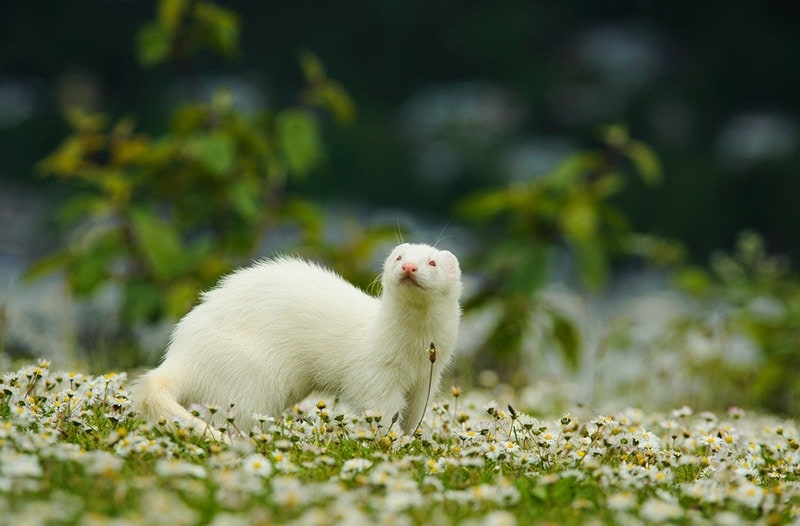Why Is My Ferret Losing Hair? 8 Vet Reviewed Reasons & What to Do

Updated on
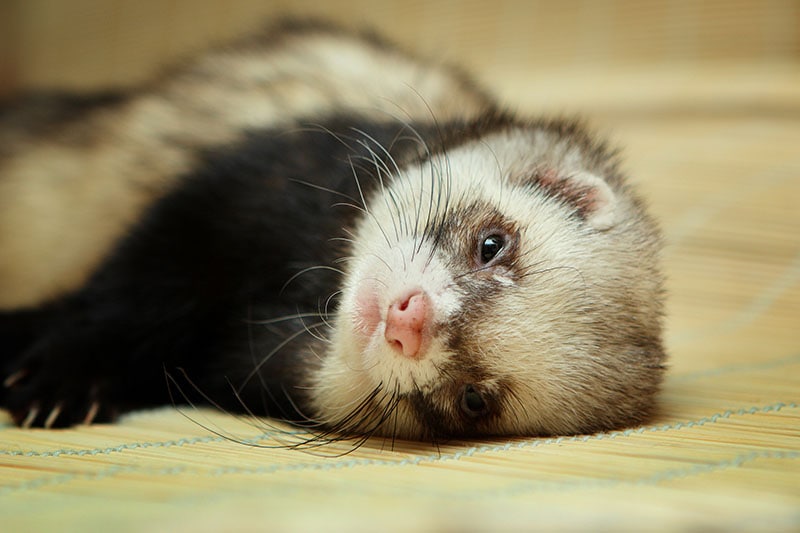
Hair loss, or alopecia, is a common problem in ferrets. It could be caused by several things, and the areas in which ferrets lose hair differ depending on the causes of alopecia.
Learn more about hair loss in ferrets, the possible causes and signs, and what you can do about it.
The 8 Reasons Why Your Ferret Is Losing Hair
1. Seasonal Hair Loss
Ferrets normally shed hair twice a year for seasonal shedding, just like many dogs and cats. In the spring, ferrets shed their thick winter coats to accommodate their lighter summer coats. In fall, they lose their thin summer coat to accommodate the thicker winter coat for warmth.
This is a natural process that helps with temperature regulation. It typically takes two to three weeks to fully shed out and for the new coat to grow in. Intact ferrets (not spayed or neutered) will also shed heavily during the breeding season in the spring and summer (March to August for females and December to July for males).
Intact ferrets may also pull out their own hair, creating patches of hair loss in order to make a bedding for potential litters.
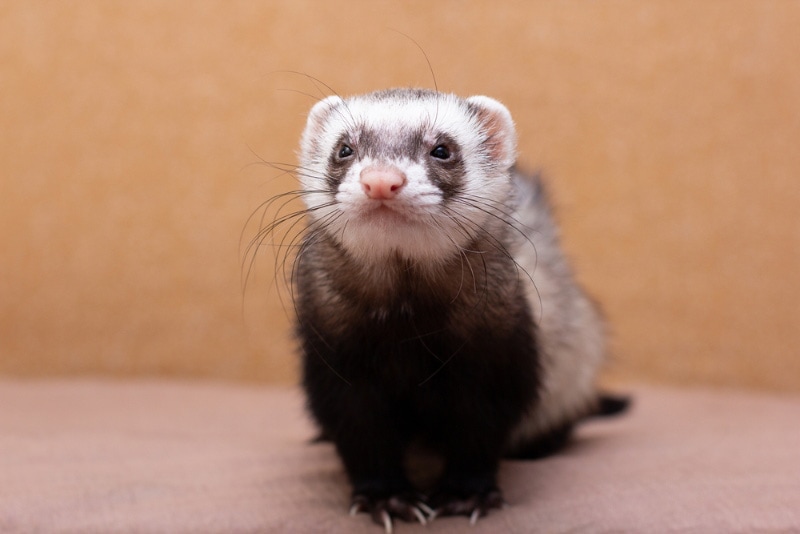
2. Adrenal Gland Disease
Adrenal gland disease is a common cause of hair loss in ferrets, which typically comes with older age. The adrenal gland overproduces sex hormones that cause the ferret to lose hair, which begins at the tail and continues until it reaches the head. Some ferrets with adrenal gland disease will have different patterns of hair loss, however. Medications can be effective in treating adrenal gland disease, but you need to visit your vet.
3. Ferret Rat Tail
In some cases, ferrets will lose the hair on their tail, giving them more of a rat-like appearance. This is a common issue for male ferrets during the breeding season, even if they’ve been neutered. Typically, the hair loss is stress related and the normal haircoat returns during the next seasonal shed.

4. Parasite Infestation
If your ferret spends a lot of time outside, they could pick up fleas or other parasites that cause hair loss. Ear mites, sarcoptes mites and fleas can be a problem for ferrets.The hair loss tends to happen when they scratch an area repeatedly, which usually happens around the shoulder and neck. You may also see redness and bumps on the skin. If your ferret scratches one area repeatedly, it’s good to visit a vet to test for parasites and determine the best course of treatment.
5. Infections
Infections that cause hair loss are not common in ferrets, but they can get ringworm or yeast infections. Skin infections may be accompanied by hair loss as well as scaly, dry or red skin, bumps, or an odor.
Ringworm causes small patches of hair loss in the affected areas, which you can treat with medication from your vet.
Yeast infections don’t affect ferrets often, but they are more common in older ferrets with adrenal gland disease or cancer. The area affected by a yeast infection will lose hair and have a crusty appearance, often on the face. You can visit your vet for a diagnosis and medication.
Bacterial infections are not common, but it’s possible for ferrets to get Staph infections. This causes excessive scratching that can contribute to hair loss, usually around the shoulders. If you suspect a bacterial infection, visit your vet, and get medication.
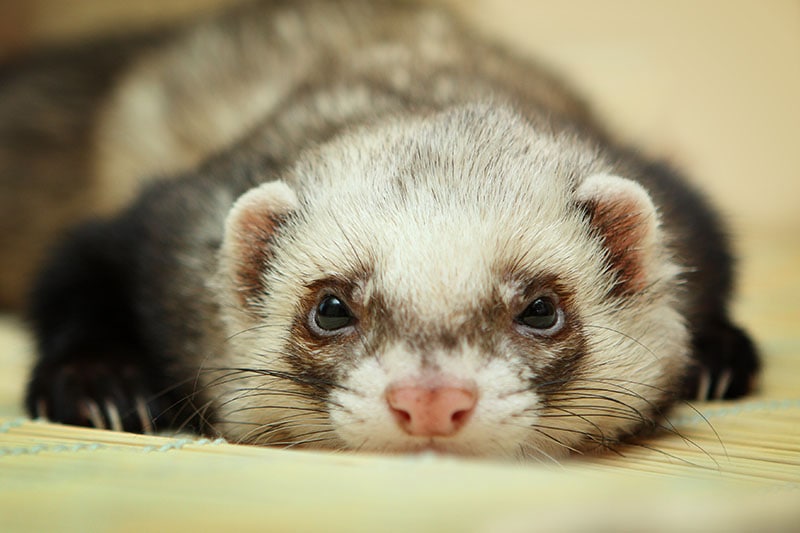
6. Poor Diet
Ferrets require a diet high in protein and fat. If your ferret isn’t getting the nutrition they need, they may experience a thin, brittle coat and partial alopecia. It’s important to feed your ferret high-quality ferret food to avoid nutritional deficiencies, which can cause many more problems than just hair loss.
7. Allergies
Ferrets can develop allergies to things in their environment as well as ingredients in their diet. These allergies can lead to dry, itchy skin, and hair loss. You may also notice other signs of allergies, including sneezing, water eyes, stomach pain, and irregular bowel movements.
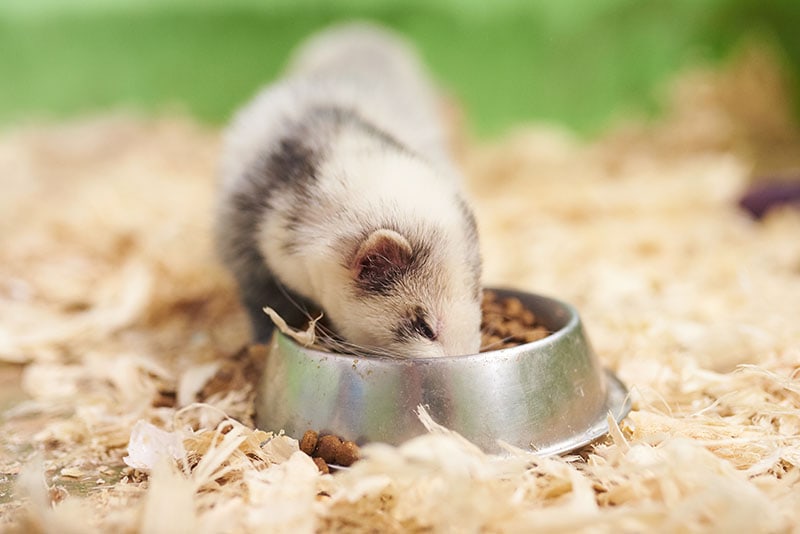
8. Cancer
Like any animal, unfortunately, ferrets can also develop skin tumors or cancer. These can show as hair loss with red and crusty skin lesions or lumps and bumps. Any change in your ferret’s skin for the worse should prompt a visit to the vet for an examination.
Conclusion
Hair loss is a common problem for ferrets. The causes range from hormonal or seasonal shedding to fleas and other parasites to more serious medical conditions. If you’re concerned about your ferret’s hair loss, schedule an appointment with your vet to determine the cause and treatment options.
Featured Image Credit: Chipiko, Shutterstock





